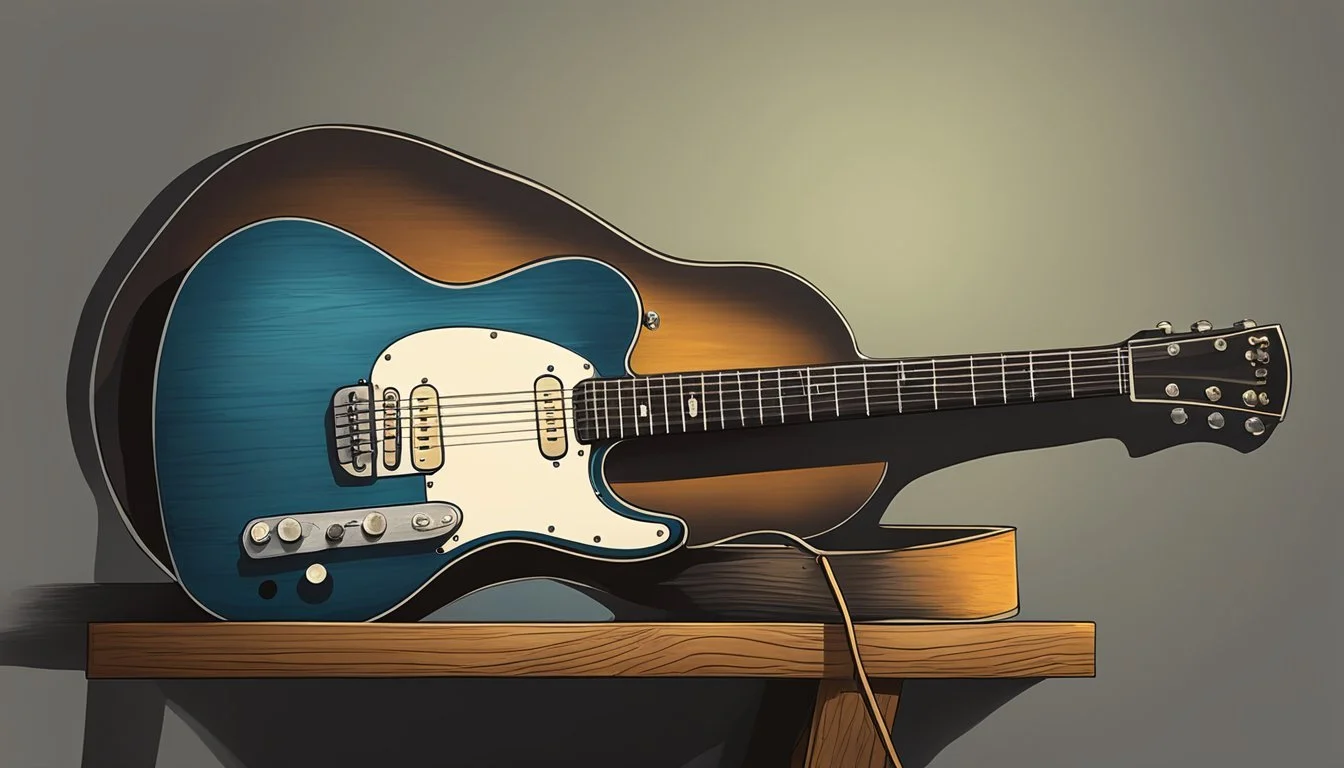The Story of Trigger
Willie Nelson's Iconic Guitar Featured in Netflix Docuseries
Willie Nelson's iconic guitar, Trigger, has been an inseparable companion throughout his legendary career. This faithful instrument has played a starring role in Nelson's music for over five decades, appearing on countless albums and live performances.
Trigger, a 1969 Martin N-20 classical guitar, has become a symbol of Willie Nelson's enduring musical legacy. Its distinctive sound and battered appearance are instantly recognizable to fans around the world. The guitar's name comes from Roy Rogers' horse, reflecting Nelson's cowboy image and love of Western culture.
The upcoming docuseries "Willie Nelson & Family" offers viewers a glimpse into the story of Trigger and its significance in Nelson's life. The trailer features footage of Nelson playing his beloved guitar, showcasing the deep connection between the artist and his instrument. Through old family photos and interviews, the series promises to explore how Trigger has shaped Nelson's unique sound and become an integral part of his identity as a musician.
The Legend of Trigger
Willie Nelson's guitar, Trigger, has become an iconic symbol of country music. This faithful instrument has been by Willie's side for decades, shaping his distinctive sound and style.
Origins and Acquisition
Willie Nelson acquired Trigger in 1969 after his previous guitar was damaged. He purchased the Martin N-20 classical guitar sight unseen for $750. Nelson named the guitar after Roy Rogers' horse, Trigger. The instrument quickly became an integral part of Willie's performances and recordings.
Willie's connection to Trigger was instant and profound. He found the guitar's tone perfectly suited to his unique playing style and vocal range. From that point on, Trigger became Willie's constant companion, accompanying him on stage and in the studio for countless performances and hit songs.
Design and Features
Trigger is a Martin N-20 classical guitar with nylon strings. It features a Sitka spruce top and Brazilian rosewood back and sides. The guitar's neck is made of mahogany with an ebony fretboard.
Over the years, Trigger has developed a distinctive appearance:
Large hole worn through the top from Willie's fingerpicking
Autographs from over 100 fellow musicians
Faded finish from years of use
Despite its worn condition, Willie has refused to retire Trigger, opting instead for repairs to keep the beloved instrument playable.
The Unique Sound
Trigger's sound is unmistakable, a key component of Willie Nelson's signature style. The nylon strings provide a mellow, warm tone that complements Willie's vocals. The guitar's classical design allows for greater sustain and resonance compared to steel-string acoustics.
Willie's fingerpicking technique, combined with Trigger's unique characteristics, creates a sound that is both percussive and melodic. The wear on the guitar's top has altered its resonance over time, contributing to its one-of-a-kind tone.
Trigger's sound has become so intertwined with Willie's music that it's hard to imagine one without the other. The guitar's distinctive voice can be heard on countless classic recordings, from "On the Road Again" to "Always on My Mind."
Willie Nelson and Trigger: A Musical Journey
Willie Nelson's relationship with his guitar Trigger has been a defining aspect of his career. The two have been inseparable for decades, creating music that has touched millions of fans worldwide.
Iconic Performances
Willie Nelson and Trigger have graced countless stages together. From intimate clubs to massive festivals, their partnership has delivered unforgettable performances. The duo's appearance at Farm Aid concerts has become legendary, with Trigger's unmistakable sound accompanying Willie's soulful vocals.
In Nashville, Willie and Trigger made their mark at the Grand Ole Opry. Their performances there helped solidify Willie's status as a country music icon. The guitar's distinctive tone has been a constant presence in Willie's live shows, from small honky-tonks to sold-out arenas.
Songs Written with Trigger
Many of Willie Nelson's classic songs were composed with Trigger in hand. "On the Road Again" and "Always on My Mind" are just two examples of hits that came to life through this musical partnership.
Trigger's unique sound has inspired Willie's songwriting process. The guitar's mellow tones have influenced the creation of ballads like "Blue Eyes Crying in the Rain." In Nashville's songwriting circles, Willie and Trigger became known for crafting tunes that spoke to the heart of country music.
The Bond Between Musician and Instrument
Willie Nelson's connection to Trigger goes beyond mere functionality. The guitar has become an extension of Willie's musical identity. He has famously said, "When Trigger goes, I'll quit."
Trigger bears the marks of countless performances, with a large hole worn through its body. Willie has refused to retire the instrument, instead choosing to have it carefully maintained. This dedication speaks to the deep emotional attachment between artist and guitar, a bond that has endured through decades of music-making.
The Cultural Impact of Trigger
Willie Nelson's guitar Trigger has left an indelible mark on music and popular culture. Its distinctive sound and iconic appearance have become synonymous with Nelson's legendary career.
Influence on Music Genres
Trigger's unique tone has shaped country, outlaw country, and Americana music. Its nylon-string sound became a signature element of Nelson's style, influencing countless musicians. Many artists have sought to emulate Trigger's mellow, warm tones in their own performances.
The guitar's weathered appearance also inspired a trend towards well-worn instruments. Musicians began to value guitars with character and history, moving away from pristine instruments.
Trigger's influence extended beyond country music. Its sound can be heard in rock, folk, and even jazz recordings. The guitar's versatility demonstrated how a single instrument could cross genre boundaries.
Trigger in Pop Culture
Trigger has become a cultural icon in its own right. The guitar's distinctive hole, worn from years of picking, is instantly recognizable to music fans worldwide.
Merchandise featuring Trigger's image is popular among Nelson's fanbase. T-shirts, posters, and even guitar picks bearing the instrument's likeness are sought-after collectibles.
The guitar has been featured in museums and exhibitions, cementing its status as a piece of American musical history. Its presence in these settings highlights Trigger's significance beyond just being Willie Nelson's instrument.
Representation in Media
Trigger has been prominently featured in numerous documentaries about Willie Nelson's life and career. These films often showcase the guitar's importance to Nelson's music and persona.
The recent docuseries "Willie Nelson & Family" dedicates significant screen time to Trigger. It explores the guitar's history and its role in Nelson's performances.
In interviews, Nelson frequently discusses Trigger, sharing anecdotes about the instrument. These stories have become part of music lore, further elevating Trigger's status.
Books and articles about iconic guitars invariably include Trigger. Its inclusion in these works cements its place among the most famous instruments in music history.
The Preservation of Trigger
Willie Nelson's iconic guitar Trigger has faced numerous challenges over the decades. Its survival and continued use are testaments to Nelson's dedication and the instrument's craftsmanship.
Restoration Efforts
Trigger has undergone extensive repairs and maintenance to keep it playable. The guitar's original finish has worn away, leaving a large hole in its body from years of strumming. Nashville luthiers have patched this hole multiple times using carefully selected wood.
The guitar's frets have been replaced several times due to wear. Nelson insists on using the original fingerboard, which has been periodically planed and refretted. Trigger's bridge has also been reinforced to withstand the tension of the strings.
Experts estimate that over 100 hours of repair work have gone into maintaining Trigger throughout its lifetime. Despite these efforts, Nelson prefers to keep the guitar's weathered appearance intact as a symbol of its history.
Exhibitions and Displays
Trigger has been featured in numerous museum exhibits celebrating Willie Nelson's career. The Country Music Hall of Fame in Nashville has displayed the guitar multiple times as part of special exhibitions on Nelson's life and music.
In 2014, Trigger was the centerpiece of a Metropolitan Museum of Art exhibit in New York City focused on iconic guitars. The exhibit highlighted the instrument's unique modifications and wear patterns.
When not on tour with Nelson, Trigger is stored in a climate-controlled vault to protect it from further damage. Select music historians and luthiers have been granted access to study and document the guitar's construction and modifications.
Willie Nelson's Legacy
Willie Nelson's impact on country music and American culture extends far beyond his musical talents. His distinctive style, activism, and enduring popularity have cemented his place as a cultural icon.
Awards and Recognition
Willie Nelson's career has been decorated with numerous accolades. He has won 12 Grammy Awards, including a Lifetime Achievement Award in 2000. The Country Music Association honored him with the Lifetime Achievement Award in 2012.
Nelson was inducted into the Country Music Hall of Fame in 1993 and the Songwriters Hall of Fame in 2001. He received the Library of Congress Gershwin Prize for Popular Song in 2015, recognizing his contributions to American music.
His album "Stardust" was inducted into the Grammy Hall of Fame in 2015. Nelson's achievements also include multiple CMA Awards and American Music Awards.
Influence on Future Musicians
Willie Nelson's unique vocal style and guitar playing have inspired generations of musicians. His cross-genre appeal has influenced artists in country, rock, and pop music.
Nelson's approach to songwriting, blending personal experiences with universal themes, has set a standard for storytelling in music. His willingness to experiment with different musical styles has encouraged artists to push genre boundaries.
Many contemporary country and Americana artists cite Nelson as a major influence. His collaborative spirit has fostered a sense of community in the music industry, inspiring cross-generational and cross-genre partnerships.
Continued Relevance in Music History
At 90 years old, Willie Nelson remains an active and relevant figure in music. His recent appearances on Paramount+ in the documentary series "Willie Nelson & Family" showcase his enduring appeal.
Nelson continues to release new music and collaborate with current artists, bridging generational gaps. His advocacy for causes like farm aid and marijuana legalization keeps him in the public eye beyond music.
His iconic guitar "Trigger" has become a symbol of his longevity and authenticity in the music industry. Nelson's ability to adapt to changing musical landscapes while maintaining his core identity ensures his ongoing relevance in music history.




